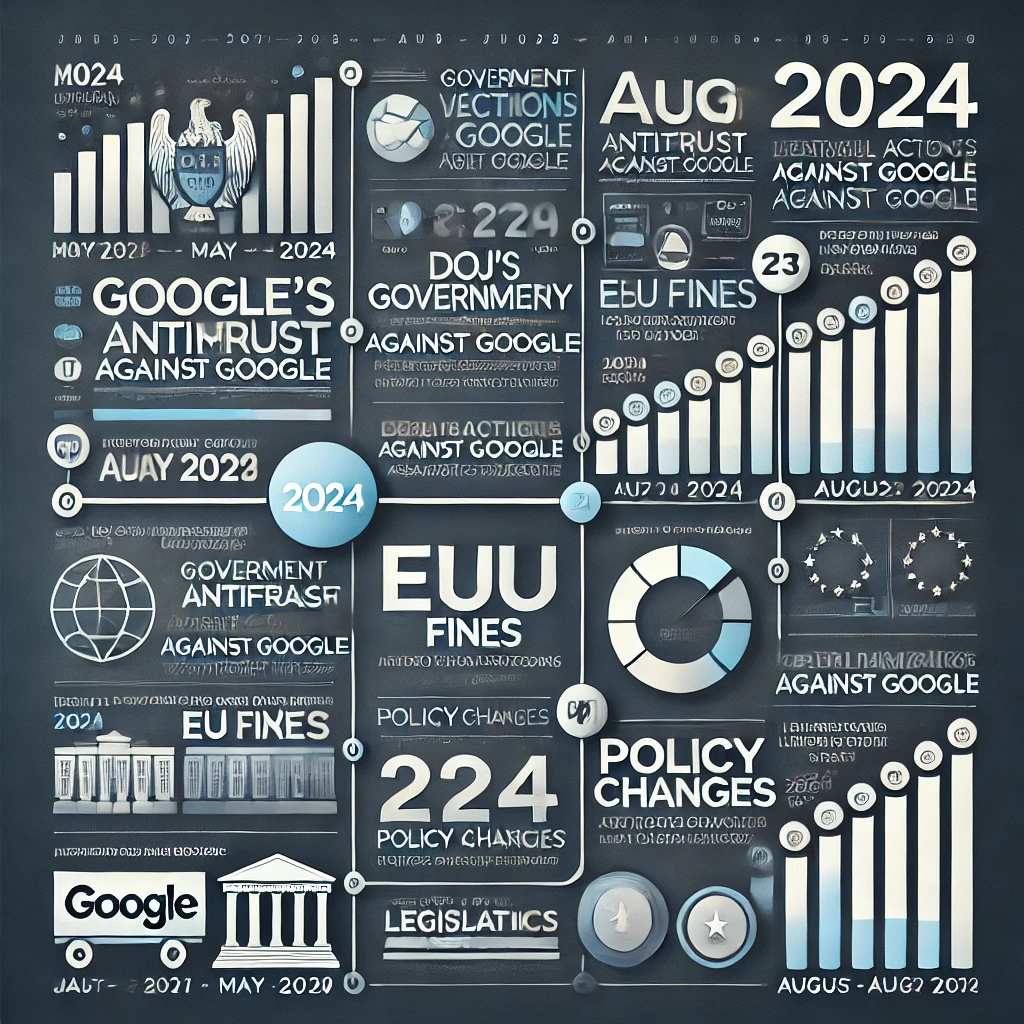Introduction to Google Regulatory Updates
Google, the tech giant that has long dominated the search engine and online advertising markets, now faces significant regulatory challenges. The focus key phrase “Google regulatory updates” reflects the current landscape, where the Department of Justice (DOJ) recently secured a major antitrust victory that could reshape Google’s future. These developments are sending ripples throughout the tech industry and raising questions about the future of big tech regulation. As policymakers increase scrutiny, Google is at the forefront of a broader effort to curb the power of tech companies. The impact of these changes extends beyond traditional technology, potentially impacting sectors like blockchain and crypto assetsas the regulatory landscape becomes increasingly complex. This blog post will explore the key changes in Google’s regulatory landscape, their impact, and what we can expect in the coming months.
What’s new in the Google Regulatory Update?
The most recent development in the ongoing Google regulatory update case is a major antitrust victory for the DOJ. This legal milestone is part of a broader push to address what many consider to be Google’s monopolistic practices. The DOJ’s victory could mark a turning point in the regulatory landscape, paving the way for the potential dismantling of Google’s business empire. As the digital economy expands, this regulatory shift could set a precedent for how centralized cryptocurrency exchanges and other blockchain-based technologies are regulated, especially as they grow in influence and market share.

Latest developments
| Date. | Events | Impact |
|---|---|---|
| August 2024 | DOJ Secures Antitrust Victory Against Google | Strengthen the position of governments seeking stricter regulation or potential dismantling. |
| July 2024 | EU Commission Fines Google for Digital Advertising Anti-Competitive Behavior | Adding pressure on Google to change its business practices globally |
| June 2024 | Google announces policy changes to comply with new privacy laws in the US and EU | It aims to pre-empt further regulatory action, but raises concerns about compliance effectiveness. |
| May 2024 | Congress introduces new bill targeting big tech monopolistic practices | It signals a legislative shift toward tighter controls on tech giants like Google. |
These developments underscore the growing momentum for increased regulation, not only in the U.S. but globally. In particular, the DOJ’s recent victory has sparked intense debate about the future of Google’s operations and the possible dismantling of its vast network of businesses. And as blockchain technology and cryptocurrenciescontinue to evolve, similar regulatory frameworks could emerge and impact the broader spectrum of the digital economy.
Key changes you should know about
As the landscape of Google’s regulatory updates continues to evolve, several key changes are emerging that will have a significant impact on the company and the broader technology industry, including emerging sectors such as cryptoassets and centralized cryptocurrency exchanges.

1. DOJ’s Antitrust Victory
The Department of Justice’s latest victory is a pivotal moment in the ongoing fight against Google’s market dominance. The court’s ruling supports claims that Google has engaged in anticompetitive behavior, particularly in online advertising. The ruling could pave the way for the DOJ to pursue more aggressive actions, including the potential breakup of the company. This regulatory approach could also have implications for how centralized cryptocurrency exchangesoperate, as they could face similar scrutiny if found to be restraining competition in the crypto asset market.
2. Increased scrutiny of advertising practices
One of the main areas where Google is facing increased scrutiny is its online advertising business. Regulators have accused Google of using its dominant position in the digital advertising market to stifle competition. The DOJ’s case highlights the need for more transparency and fair practices, which could lead to increased regulation of how Google operates its advertising platform. This increased focus on transparency could spill over into the blockchain space, where transparency and decentralized governance are already core principles.
3. global regulatory pressures
Beyond the U.S., Google is also facing criticism in Europe, where the European Union is slapping the company with a hefty fine for allegedly engaging in anti-competitive behavior. The EU’s actions are part of a broader trend of global regulators taking a tougher stance against big tech. This international pressure could force Google to adopt more uniform global practices, complicating its business operations. In the case of blockchain technology and cryptoassets, this global regulatory pressure could lead to the development of standardized international regulations, which could impact how these technologies are deployed and managed globally.
4. possible breakup of Google
Perhaps the most important potential outcome of these regulatory updates is the possible breakup of Google. The DOJ has suggested that breaking up Google’s business units may be the only way to restore competitiveness in the marketplace, which would involve separating its search engine, advertising business, and other ventures into distinct entities, significantly altering the technology landscape. If this precedent is set, it could encourage similar regulatory action against other dominant players in the digital economy, including major centralized cryptocurrency exchangesthat control a significant portion of the crypto asset market.
What’s next?

Google’s future amid these regulatory challenges remains uncertain. The DOJ’s antitrust victory marks just the beginning of a prolonged legal and political battle. If the DOJ successfully pushes for a breakup, it could set a historic precedent, impacting not only Google but the entire tech industry. This precedent may also influence the blockchain and crypto sectors, where similar concerns about market power are emerging.
In the short term, Google is likely to ramp up its lobbying efforts to shape future legislation and regulations. However, with strong momentum behind the regulatory push, Google may struggle to sustain its current business model without significant changes. This situation parallels the challenges faced by centralized cryptocurrency exchanges as they navigate complex regulatory landscapes.
As global regulators increasingly coordinate their efforts, a more unified approach to tech regulation could emerge, imposing stricter and more comprehensive rules on companies like Google. The outcome of these regulatory efforts will be closely watched by other tech giants and leaders in blockchain and cryptocurrency, who may face similar scrutiny in the future.
Conclusion
The recent Google regulatory update signals a major shift in the dynamic between big tech and government regulators. The Justice Department’s antitrust win against Google could lead to transformative changes, including the possibility of breaking up the company. As this situation develops, both Google and the broader tech industry must navigate a more complex regulatory environment. The repercussions could reshape how tech companies operate and compete globally, with potential ripple effects for blockchain and crypto assets as regulators apply similar oversight across the digital economy.
Key takeaways
- The DOJ’s antitrust victory over Google could lead to stricter regulation or a potential breakup.
- Google is under scrutiny for its online advertising practices, which could lead to more transparency and fairer competition.
- Global regulatory pressure, especially from the EU, is forcing Google to adjust its practices globally.
- Google’s potential breakup could significantly alter the tech landscape and set a precedent for other big tech companies.
- The future of Google’s operations remains uncertain as the company faces ongoing legal and regulatory challenges.
- Similar regulatory scrutiny may extend to blockchain and crypto assets, particularly with respect to market power and transparency.
See also
- Bloomberg. (2024). DOJ Considers Seeking Google Breakup After Major Antitrust Win. Retrieved from https://www.bloomberg.com/news/articles/2024-08-13/doj-considers-seeking-google-goog-breakup-after-major-antitrust-win
- The Verge. (2024). What Google’s Antitrust Fight Could Mean for the Future of Big Tech. Retrieved from https://www.theverge.com/2024/08/14/google-antitrust-doj-impact
- Financial Times. (2024). Google Faces Growing Global Regulatory Pressure Amid Antitrust Rulings. Retrieved from https://www.ft.com/content/google-global-regulatory-pressure
- Wired. (2024). Why a Google Breakup Could Be Closer Than You Think. Retrieved from https://www.wired.com/story/google-breakup-closer-than-you-think
- YouTube. (2024). Google vs. DOJ: The Antitrust Showdown Explained. [Video]. Retrieved from https://www.youtube.com/watch?v=xyz987654
